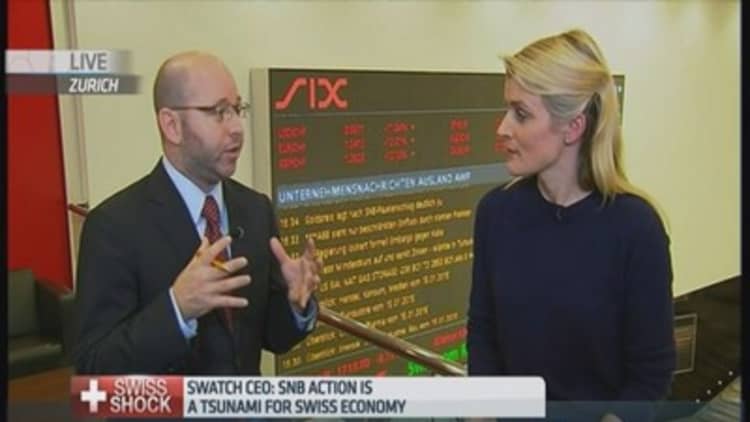Both the Swiss franc and the yen will remain where traders flee for safety, despite the Swiss National Bank's surprise move to remove its euro peg, say analysts.
"If anything, the Swiss central bank's decision to remove the floor and cut interest rates will make the franc easier to flee to in times of uncertainty and volatility," said Kengo Suzuki, chief currency strategist at Mizuho Securities. "Now that the Swiss franc can be traded freely, and borrowed cheaply because of the negative interest rates, it will remain, along with the yen, the safe haven currency of choice."
Markets were caught off guard Thursday when the Swiss National Bank (SNB) canceled its policy pegging the exchange rate of the euro buying 1.20 Swiss francs, a policy put in place more than three years ago to keep the currency from getting too strong and hurting the economy. The SNB also cut interest rates deeper into negative territory, by 50 basis points to negative 0.75 percent, in an effort to help cushion the blow.

But those low rates didn't deter traders from piling into the franc. After the announcement, the Swissie surged more than 30 percent within minutes to a record high against the euro, with the common currency fetching only around 0.86 franc, before recovering to around 1.0081-1.0086franc in Asian trade Friday.
Hot & liquid
It's all about the hot money and liquidity.
Thursday's wild moves were a liquidity issue –a flood of stop sell orders weren't matched by bid offers because no one had any reason to think the Swiss franc would strengthen as it was kept in check by the SNB's peg to the euro, said Mizuho's Suzuki.
Read MoreIMF's Lagarde on Swiss move: 'A bit of a surprise'
Caught off-guard, many hedge, and other speculative, funds were forced to unwind their short yen positions to cover their losses on the Swiss Franc, said Khoon Goh, senior FX strategist at ANZ.
As a result, the yen also strengthened overnight, although by much less than the Swiss Franc.The dollar was fetching around 117.80 yen in mid-afternoon Asian trading hours on Thursday, after flirting with the 116 yen level in late New York trading.
Hot money, or speculative funds that flow quickly in and out of countries, felt the pain. Many had already been nursing losses on their short yen positions, according to analysts. The yen has weakened by around 20 percent against the dollar since mid-August and many assumed theJapanese currency would continue to be sold against the dollar. In the week ending January 6, speculative positions against the yen totaled $8.5 billion, Goh said, citing CFTC figures.
But since the start of this year, the yen strengthened against the U.S. dollar, with the greenback going from fetching 120.49 yen on January 2 to around 115.90 yen in Thursday's trade.
Ball in ECB's court
Traders are now keeping a close eye on the major central banks.
The Swiss franc's wild gyrations Thursday were essentially position adjusting ahead of next week's European Central Bank meeting, said Yunosuke Ikeda, Nomura's chief currency strategist. The ECB is widely expected to introduce some form of monetary easing, which in turn is projected to drive the euro yet lower against the dollar. In Asian trade Friday, the euro was fetching $1.163, compared with $1.175 before the SNB's move.
For the yen, the Federal Reserve's expected interest rate hike, which many analysts expect around mid-year, will likely be a bigger driver than the ECB, but there's not much consensus on how the Japanese currency will react.
Assuming the Fed does raise rates, Mizuho's Suzuki sees the dollar fetching 128-138 yen by the end of 2015 and Nomura's Ikeda expects it at 125 yen. ANZ's Goh, who reckons the rate hike is already priced in, sees the greenback fetching 120 yen at the end of this year.

